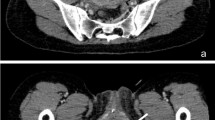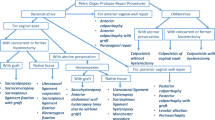Abstract
Rectovaginal fistula are a relatively rare kind of anorectal fistulas. Spontaneous healing is rare and the rectal advancement flap repair is the most popular procedure with success rates ranging between 60% and 80%. We present a new technique for repairing damage in the rectovaginal septum that consists of placing a folded polyglycolic acid mesh (Dexon) between the levator ani muscle closure area and the vaginal wall. This absorbable mesh separates the suture lines on the vaginal and rectal walls, and induces fibrosis and healing. The technique was performed in four women suffering from a rectovaginal fistula due to different causes. It was successful in all cases.
Similar content being viewed by others
Author information
Authors and Affiliations
Corresponding author
Rights and permissions
About this article
Cite this article
Walfisch, A., Zilberstein, T. & Walfisch, S. Rectovaginal septal repair: case presentations and introduction of a modified reconstruction technique. Tech Coloproctol 8, 192–194 (2004). https://doi.org/10.1007/s10151-004-0088-y
Received:
Accepted:
Issue Date:
DOI: https://doi.org/10.1007/s10151-004-0088-y




